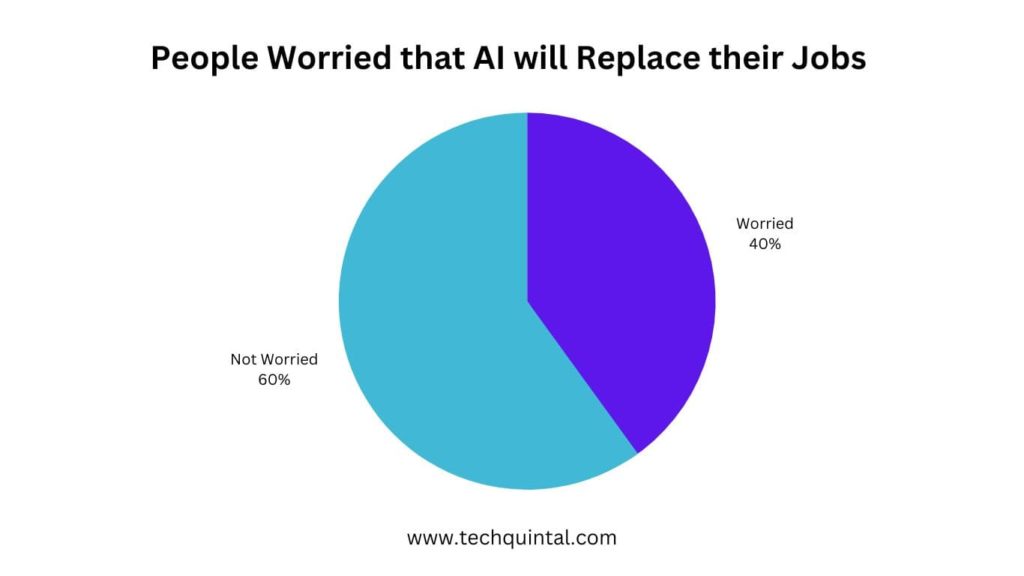
We all can agree that change is the only constant, and trends in the job market are no exception. There are several factors that directly or indirectly impact the job market, which in turn make a difference in our lives. Technology has the potential to change our way of living drastically depending on the way we use it. Let’s explore the impact that technology is having on the job market.
How Technology Impacting the Job Market: Quick Answer
Technology is significantly impacting the job market by automating routine tasks, potentially leading to job displacement in certain sectors. However, it is also creating new roles and industries that require specialized skills in areas like artificial intelligence, data analysis, cybersecurity, etc. Moreover, technology enables remote work. This in turn leads to a more flexible and globalized workforce.
Exploring the Impact of Technology on Job Market
Just like yin-yang, there are upsides as well as downsides of technology. The basic example is automation, it has helped us to increase our productivity and earn more profits but on the other hand, it has eliminated some jobs leading to an increase in the unemployment rate.
Positive Impacts
We all have to agree that no matter how far the human mind explores, there are still complex tasks that we cannot perform on a regular basis. This is where technology backs us up. Powered by human minds, these technologies have the ability to carry out complex operations smoothly.
Consistency is something that is cherished in the job market and compared to humans, technology has proved to be more consistent over the years. Businesses can depend on technology to function 24×7 with little to no maintenance, whereas expecting the same from humans would be considered inhumane.
In simple words, with the help of technology, we can accelerate the growth in the job market in a more convenient way.
Here are a few points that show how technology impacts employment positively:
- Technology improves productivity and reduces the burden on employees.
- It helps reduce the amount of time taken to complete a task.
- Increases job opportunities for the educated.
- It also makes work environments much safer.
- Technology also reduces the margin of error, especially in analytical or data-centric jobs.
- Creates jobs in rural areas.
- Allows people to work from anywhere.
Negative Impacts
Just imagine if we keep on implementing technology at every step, what will happen to the workforce? Eventually, technology will take over and jobs will become redundant. Businesses will invest more in implementing technologies over hiring people and the ones with stable jobs would be those few people with exceptional technical skills.
There’s no denying that skill sets are the most basic requirement for any job role and the ones who learn new skills can live a much more stable life than the others. Stability at least in terms of job security.
Technology has also impacted the job market negatively. Here’s how:
- Automation has replaced and will replace many humans, leading to higher rates of unemployment.
- Future jobs might lack a human touch and won’t factor in emotions.
- Technology is rigid and can’t think on its own.
- It will reduce creativity in jobs.
- Sometimes, customers might prefer a human to a machine.
- It can create a skill divide between those able to adapt to the changes and those unable to.
- It will also lead to income inequality.
Missing Aspects
If you look around, you will find people who are not willing to acknowledge or appreciate the positive impact technology is creating in our lives instead they focus on the negative impact. We can try to understand them.
It is perfectly normal for them to look at the jobs that have been destroyed because of technological advancement but what is missed here, is the opportunity that has been created simultaneously with these advancements. The opportunities are subjective too, the ones who keep up with the pace are at the top of job markets and the ones who are slow to accept technological change are lagging.
In the theoretical aspect, the errors can be entertained but when it comes to real life, any minor error can prove to be fatal. We have been able to eliminate human errors and risks with the help of technology. Our world is complex and technology has helped us to understand it much better than we did back then.
By eliminating risks we have been able to create a safe environment around us. The potential risks that were difficult to get rid of previously can be easily dealt with by identifying the same in the planning process with the help of technology. We have learned to be a step ahead in casualties and better prevent it, all because of technology.
There is also an important aspect that is missed out by most, the thing that if the company is capable of being more productive using technology, then they will create more job roles so that they can stay ahead in the competition. Maybe the inverse proportion is not true in every case, there is a direct proportion here, more productivity will lead to the creation of more job roles, even tech jobs.
Again, this is another perspective of exploring the concept of technology and its impacts and it varies depending on the section of the job market that we are considering.
Become a Life-Long Learner
We can bet that lifelong learners will not have a hard time dealing with the impacts of technology in the job market. They are the ones who are willing to leave their comfort zones in order to explore and learn new things that have a positive impact. It’s the second nature of humans to be curious about current trends and explore how it is impacting the present, and how they will impact the future.
When most of the repeated tasks are allocated to technology-driven machines, humans will have more time in hand to invent and create. With technological advancement, the time, energy, and efforts of humans will be invested in creating more meaningful things over carrying out the same routine tasks that have little to no changes.
Accepting Reality
The impact of technology on the job market cannot be this dreadful, can it be? We cannot ignore the reality so why make an exception this time, let’s prepare ourselves instead. We know technology is the future and over time it will become an integral part of human existence.
We can accept this reality and rather focus on learning new skills that will be valuable and cannot be replaced easily by technology. You can use a job search engine to find such jobs apt for your requirements.
Also, have you observed how there has been an increase in high-paying jobs in the market since technology implementation? This is because the skills are appreciated more now and businesses are willing to pay extra to combine human skills and technology to earn the maximum profits.
Different technologies and their impact on employment
Below is a table that lists various technologies and their impact on employment, both good and bad:
| Technology | Positive | Negative |
|---|---|---|
| AI | Can increase productivity | Able to replace existing jobs |
| Remote work | Allows employees to work from anywhere | Severe impact on real estate as businesses would no longer rent an office |
| E-commerce | Creates new jobs | Hard for offline retailers |
| Telehealth | Allows more personnel to join the healthcare industry | Reduces the demand for a few traditional roles |
| 3D printing | creates new opportunities in the production and manufacturing sectors | Replaces low-level labor |
Jobs that might get replaced by technology
Technologies like AI and automation are on the rise, and chances are they might replace a few jobs in the near future. Although beneficial for humanity in the overall scenario, they will certainly make a few jobs obsolete.
In fact, reports from organizations such as the WEF also claim the same, and the attitude is also reflected in the workforce. In a recent survey, almost 40% of employees expressed concerns that their jobs might be replaced by AI or automation.

But what is the future of work? While you can watch the following video to learn more on the topic, we have created a list of jobs that might soon be replaced by technology:
1. Advertising, content creation & technical writing
A good chunk of media jobs, such as advertising, content and technical writing, content creation, and so on, are at risk of oblivion due to the rise of AI. Programs such as ChatGPT have already proven their prowess and ability to serve as an alternative to these roles. It begs the question of whether companies will even bother recruiting new personnel for such tasks that can be done by a computer program.
2. Market research analysts
Technology has always been good at collecting and analyzing data and is likely to only improve with the addition of AI. So, what will become of the market research analyst position? They are typically in charge of collecting data, identifying trends, and finally using the data to reach a decision—all things that an AI already excels at.
3. Financial Analysts
Similarly, a financial analyst mostly has to deal with numbers, yet another thing that AI can do. Although there are certain rules involved, an AI can easily be trained to perform the same tasks as a financial analyst, personal financial advisor, and other similar roles.
AI will be able to identify market trends much faster and with more accuracy, highlight the data that might be beneficial for an investor, and make informed decisions based on its own data-driven conclusions with minimum human input.
4. Tech Jobs
More likely than not, coding and computer programming roles would be automated. At least entry-level jobs are unlikely to survive the onslaught of AI. However, it is equally likely that these jobs would evolve to incorporate AI and not exclude it, automating certain parts of the duties while focusing more on what might require a human eye.
5. Customer Service Agents
And lastly, we might have to say bye to the customer care executive or agents who handle customer-facing posts. Many companies have already started using chatbots and minimized human interaction. It will likely increase in the near future as we gain access to better technology.
Conclusion
We covered how our agreeableness to change and willingness to accept technology in the job market are related. We saw the impact of technology in both negative and positive lights, but we cannot take a side with one aspect. We will have to accept both types of impacts of technology in the job market to eliminate our fear of job insecurity and find better opportunities for ourselves.
Let’s keep in mind that businesses look for human resources who are capable of adapting quickly to changing times. They are in constant search of a quality workforce that will become an asset to the firm instead of becoming a liability struggling with the advancement of technology.